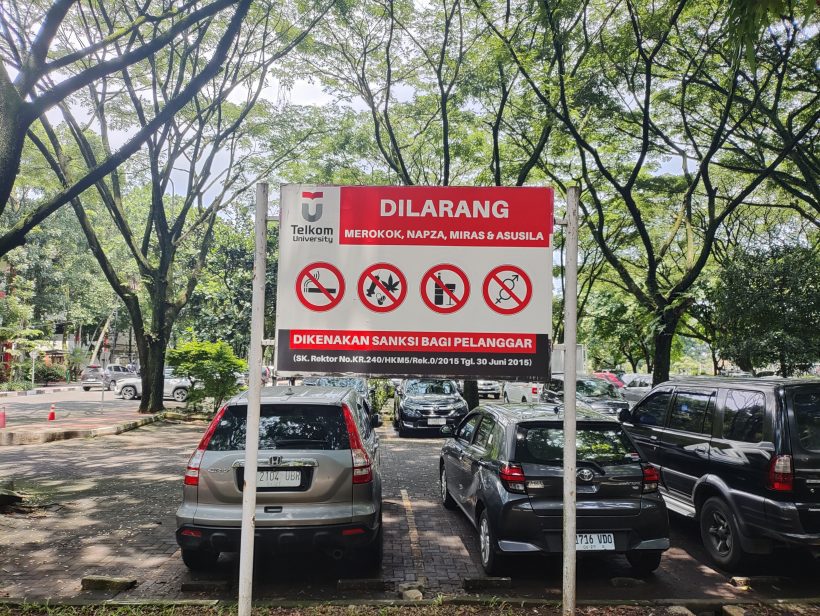Creating a clean and conducive learning environment requires maintaining high-quality air. At Telkom University, implementing smoke-free zones, prohibiting the abuse of narcotics, alcohol, and other harmful substances, along with maintaining ethical behavior, exemplifies the university’s commitment to improving campus air quality. This article will explore effective strategies to enhance air quality at Telkom University, emphasizing the implementation of smoke-free zones.
The Importance of Smoke-Free Zones in Educational Environments
A smoke-free zone is defined as an area where smoking is strictly prohibited to safeguard air quality and public health. Poor air quality can lead to respiratory diseases, allergies, and other chronic health issues. According to the World Health Organization (WHO), air pollution is responsible for approximately 7 million deaths annually worldwide.
In an academic setting, clean air is essential for enhancing concentration and productivity. With over 35,000 active students, establishing smoke-free zones at Telkom University is a vital step in protecting the campus community from the health risks associated with cigarette smoke.
Telkom University’s Smoke-Free Zone Policy
Telkom University has introduced a comprehensive smoke-free policy as part of its Green Campus initiative. Key aspects of this policy include:
- Campus-Wide Smoking Ban:
Smoking is prohibited in all indoor and outdoor campus areas, including classrooms, corridors, gardens, and parking spaces. - Strict Penalties for Violations:
Violators face consequences ranging from warnings to administrative actions, such as reduced academic performance assessments for students caught smoking in designated smoke-free zones. - Education and Awareness Campaigns:
Regular campaigns are conducted to highlight the benefits of smoke-free zones and the dangers of smoking through seminars, workshops, and social media initiatives. - Supportive Health Facilities:
To encourage healthier lifestyles, the campus offers sports facilities, green open spaces, and health clinics to support students transitioning to a smoke-free lifestyle.
Benefits of Implementing Smoke-Free Zones
- Enhanced Air Quality:
Eliminating cigarette smoke leads to fresher air, directly benefiting the respiratory health of students and staff. - Comfortable Learning Environment:
Smoke-free zones ensure a conducive academic atmosphere free from cigarette smoke-related disruptions. - Increased Environmental Awareness:
This policy educates the academic community on the importance of clean air and its impact on ecosystems. - Improved Campus Reputation:
Becoming a smoke-free institution reinforces Telkom University’s commitment to health, sustainability, and environmentally conscious education.
Additional Steps to Improve Air Quality
Besides implementing smoke-free zones, additional strategies include:
- Campus Greening Initiatives:
Planting trees in unused areas and creating green spaces help filter air pollutants while fostering a serene atmosphere. - Sustainable Transportation:
Introducing electric vehicles or bicycles for on-campus transport reduces carbon emissions. - Air Quality Monitoring:
Installing air quality monitoring devices across campus ensures the environment remains safe and healthy. - Continued Education:
Hosting workshops or discussions on clean air awareness promotes long-term behavioral changes among students.
Challenges in Establishing Smoke-Free Zones
- Cultural Smoking Habits:
Breaking ingrained smoking habits among students and staff can be challenging. - Limited Awareness:
Some individuals may not fully understand the adverse effects of smoking on health and the environment. - Collective Commitment:
Effective enforcement of smoke-free policies requires active participation and commitment from the entire campus community.
Conclusion
Creating smoke-free zones at Telkom University is a pivotal step toward establishing a healthier and more sustainable learning environment. This initiative protects the health of the academic community while contributing to broader environmental sustainability goals. Supporting smoke-free zones also aligns with collective responsibility for achieving cleaner air quality.


Leave a Reply